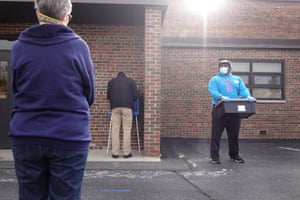Wisconsin
Polls open after governor tried to cancel in-person voting because of coronavirus, only to be overruled by state supreme court

Photograph: Scott Olson/Getty Images
Wisconsin voters headed to the polls on Tuesday, to cast ballots amid a global pandemic after a stunning 24-hour period in which the state’s governor tried to cancel in-person voting because of the public health risk, only to be overruled by the state supreme court.
The US supreme courthad weighed in, hours before the polls opened, to tweak election rules in the state.
Even though the Democratic race between Joe Biden and Bernie Sanders is winding down, the Wisconsin contest has exploded in controversy. It is both the most significant battle so far between Republicans and Democrats over the right to vote in 2020 and a chaotic scramble to protect both the vote and public health.
It is remarkable that the polls are open on Tuesday. In late March the governor, Tony Evers, issued an executive order instructing people to stay at home. There is such a severe shortage of poll workers that Evers asked the national guard to step in.
Last week, 111 jurisdictions reported not having enough poll workers to staff even one voting location. Jurisdictions are significantly limiting where people can vote. Milwaukee, which usually has 180 poll sites, will now have just five. Long lines formed on Tuesday at polling locations after polls opened, prompting fears that the election could represent a serious public health risk in the face of the virus.
Omar Jimenez
(@OmarJimenez)In the middle of the coronavirus pandemic, THIS is the line for in person voting as the polls open for Election Day in Wisconsin. #COVID19 #ElectionDay pic.twitter.com/WplsSHy9RF
April 7, 2020
Patrick S. Tomlinson
(@stealthygeek)Milwaukee, WI. 45 minutes after polls open. The line to vote goes on for a quarter mile at this station alone. Masks and social distancing abound. So proud and scared for my city. pic.twitter.com/5px2XZ6Ysn
April 7, 2020
The Wisconsin elections commission has declined to project turnout, but it is expected to be low. Democrats say Republicans are banking on low turnout to help Daniel Kelly, a conservative justice on the state supreme court, hold on to his seat.
On Monday, after weeks of rebuffing efforts to delay the election, Evers issued an executive order seeking to delay in-person voting until 9 June.
Republicans, who have resisted calls to mail a ballot to every voter and ease restrictions on mail-in voting, challenged the order in the state supreme court, where conservatives hold a majority. The court overruled Evers and ordered the election to move forward. Kelly recused himself from the decision.
The US supreme court weighed in late, upholding a lower court order extending the deadline by which mail-in ballots could be received from 7 April to 13 April.
But in a 5-4 decision, the high court accepted a request from Republicans to require ballots to be postmarked by election day, in order to count.
That rule is likely to disenfranchise thousands of voters who have not yet received ballots even though they requested them by the state’s deadline, Justice Ruth Bader Ginsburg wrote for the four liberal justices who dissented. Nearly 10,000 voters had requested ballots but had not received them as of Tuesday morning, the Wisconsin elections commission reported. More than 400,000 voters also had yet to return their ballots, according to data released by the commission.
Sanders, who called for the election to be delayed, said on Monday his campaign would not engage in “traditional” efforts to turn out voters, echoing the state Democratic party.



